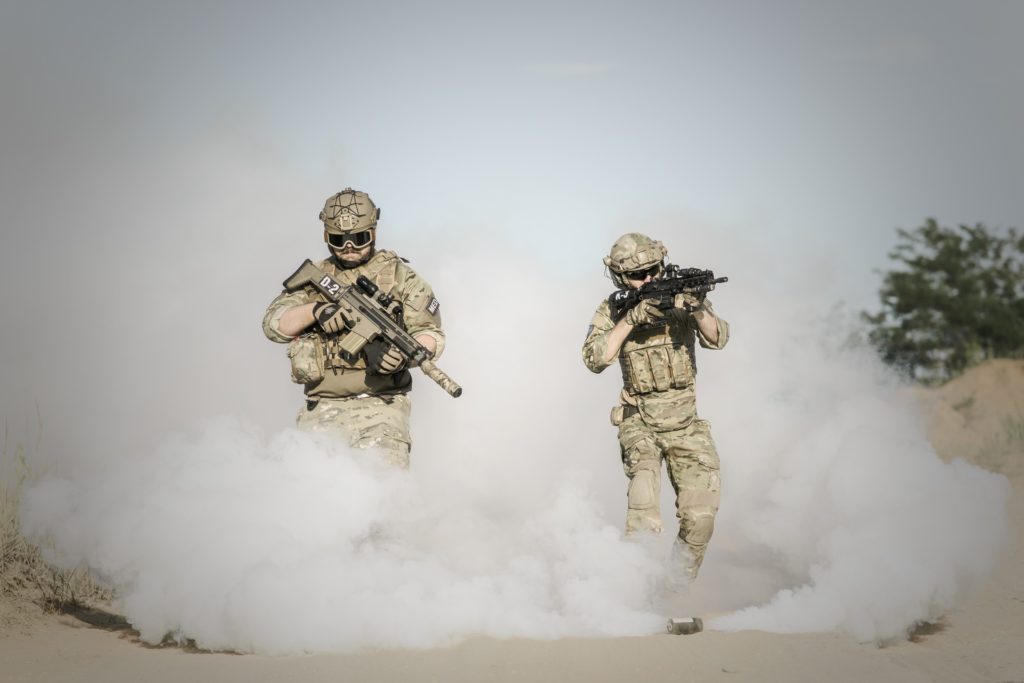
Since the War of Terror began following the attacks on the United States on September 11, 2001, nearly 3 million Americans have served on military deployments. [1] Like the soldiers who have gone before them, they faced risks to their physical and mental health, not to mention the 7,000 who have died in combat. [2] In the words of Civil War General William T. Sherman, “War is hell.”
That sentiment stands true for all combat experiences. However, those who have served since 9/11 have been more likely to be deployed more than once and saw more combat than those in previous wars. In other words, they experienced hell on more than one occasion. [3]
Additionally, a poll by the Pew Research Center [4] reports that veterans faced many challenges since returning from service. Nearly half say they had “emotionally traumatic or distressing experiences related to their military service, compared with one-quarter of pre-9/11 veterans.” And 35% sought professional services to work through the issues related to their experiences. The poll also found that:
- 61% had trouble paying their bills
- 42% had difficulty getting medical care for themselves or their families
- 41% say they struggled with alcohol or substance abuse
Engaging in combat appears to increase the likelihood of substance and alcohol use and leading to higher rates of addiction in military members. A study by the University of California San Fransisco and the researchers at the UCSF-affiliated San Francisco Veterans Affairs Medical Center found that it is not unusual for veterans to isolate themselves and turn to alcohol to avoid reminders of combat. [5]
 l and personal challenges increase for those who have killed an enemy combatant. Killing someone is a topic veterans report that they least want to talk about, but it is the topic they are most often asked about by others. Taking the life of someone, even when it comes in the line of duty, can surface a “dark side” that many soldiers didn’t know existed before combat and trying to deal with this trauma often leads to higher rates of addiction in military members.
l and personal challenges increase for those who have killed an enemy combatant. Killing someone is a topic veterans report that they least want to talk about, but it is the topic they are most often asked about by others. Taking the life of someone, even when it comes in the line of duty, can surface a “dark side” that many soldiers didn’t know existed before combat and trying to deal with this trauma often leads to higher rates of addiction in military members.
Natalie Purcell, Ph.D., who directs the Patient Centered Care Program at the San Francisco Veterans Affairs Medical Center, describes the impact of killing in combat as a “moral injury,” which can negatively impact a soldier’s sense of identity and self-esteem. “We found that, for many veterans, killing provokes a moral conflict with a lasting impact on their sense of self, spirituality, and relationships with others.”
All of these factors provide context to rising rates of addiction in military members and a recent study by the National Bureau of Economic Research (NBER) titled, “Did the War on Terror Ignite an Opioid Epidemic?” It found that combat puts veterans at “substantial risk for abusing prescription opioids and even heroin — more so than service members who deployed but never saw a firefight” [6]. The researchers found that opioid abuse was 7 percent higher, and heroin use was 1 percent higher for those who had experienced combat when compared to veterans who had not been in battle.
The researchers at NBER were also interested in discovering whether there was a connection between the increased military deployments following September 11, 2001, and the rise of opioid abuse in the United States. Resul Cesur, associate professor of healthcare economics at the University of Connecticut and lead researcher, said that their study led them to conclude that the “reason why so many military people are using opiates is because they are exposed to combat.”
 In addition to the factors mentioned above, there appears to be a link between being prescribed opioids for wartime injuries and becoming dependent on them. In their research, they found that one out of every three veterans abusing opioids had been wounded in combat.
In addition to the factors mentioned above, there appears to be a link between being prescribed opioids for wartime injuries and becoming dependent on them. In their research, they found that one out of every three veterans abusing opioids had been wounded in combat.
Air Force Captain Carl Beyer, who works with the University of California Davis Medical Center, Sacramento, California, and the David Grant Air Force Medical Center at Travis Air Force Base in California, explored the connection between addiction in military members and opioid abuse for those who have been injured in battle. He found that nearly 15% of those wounded in combat developed persistent opioid use, and a total of 6.7% went on to opioid abuse. [7]
In light of these findings and addressing addiction in military members, it should be noted that the U.S. Department of Health and Human Services recently released new guidelines for appropriate prescriptions and how to taper off opioids for those in chronic pain. Many doctors are seeking alternative means for managing chronic pain.
The American Association of Anesthesiologists (AAA) lists several alternate resources for managing chronic pain, including:
- Physical therapy
- Acupuncture
- Surgery
- Injections or nerve blocks
- Radio waves
- Electric signals
- Spinal cord stimulation
- Pain pumps
The AAA also states that “One of the most promising research areas involves harvesting stem cells from a patient’s bone marrow and injecting them into an area, such as the lower back, that has become painful because the tissue has deteriorated. The hope is that the stem cells will build new, healthy tissue and relieve the pain for good.”
REFERENCES:
[1]McCarthy, N. (2018, March 20). 2.77 Million Service Members Have Served On 5.4 Million Deployments Since 9/11 [Infographic]. Retrieved December 3, 2019, from https://www.forbes.com/sites/niallmccarthy/2018/03/20/2-77-million-service-members-have-served-on-5-4-million-deployments-since-911-infographic/#5edf509050db.
[2] Congressional Research Service. (2019). U.S. War Costs, Casualties, and Personnel Levels Since 9/11. U.S. War Costs, Casualties, and Personnel Levels Since 9/11. Retrieved from https://fas.org/sgp/crs/natsec/IF11182.pdf
[3] Livni, E. (2019, November 9). US veterans who served after 9/11 are different from their predecessors. Retrieved December 3, 2019, from https://qz.com/1745573/us-veterans-who-served-after-9-11-are-different-from-predecessors/.
[4] Igielnik, R. (2019, November 7). Key findings about America’s military veterans. Retrieved December 3, 2019, from https://www.pewresearch.org/fact-tank/2019/11/07/key-findings-about-americas-military-veterans/.
[5] Kurtzman, L. (2019, November 21). Killing in War Leaves Veterans with Lasting Psychological Scars, Study Finds. Retrieved December 3, 2019, from https://www.ucsf.edu/news/2016/12/405231/killing-war-leaves-veterans-lasting-psychological-scars-study-finds.
[6] Kime, P. (2019, October 14). Combat troops at higher risk for opioid, heroin addiction, study says. Retrieved December 3, 2019, from https://www.militarytimes.com/pay-benefits/2019/10/14/combat-troops-at-higher-risk-for-opioid-heroin-addiction-study-says/.
[7] Young Investigator competition, poster session award winners announced on final day of 2019 MHSRS. (2019, August 22). Retrieved December 3, 2019, from https://health.mil/News/Articles/2019/08/22/Young-Investigator-competition-poster-session-award-winners-announced-on-final-day-of-2019-MHSRS?type=Articles.
[8] Achenbach, J. (2019, October 11). New guidelines on opioid tapering tell doctors to go slow. Retrieved December 3, 2019, from https://www.washingtonpost.com/health/new-official-guidelines-on-opioid-tapering-tells-doctors-to-go-slow/2019/10/10/add3886e-eb60-11e9-9306-47cb0324fd44_story.html.
[9] American Association of Anesthesiologists. (n.d.). Non-Opioid Treatment for Chronic Pain – When Seconds Count. Retrieved December 3, 2019, from https://www.asahq.org/whensecondscount/pain-management/non-opioid-treatment/.
About the Author:
 Travis Stewart, LPC has been mentoring others since 1992 and became a Licensed Professional Counselor in 2005. His counseling approach is relational and creative, helping people understand their story while also building hope for the future. Travis has experience with a wide variety of issues which might lead people to seek out professional counseling help. This includes a special interest in helping those with compulsive and addictive behaviors such as internet and screen addiction, eating disorders, anxiety, and perfectionism. Specifically, he has worked with eating disorders since 2003 and has learned from many of the field’s leading experts. He has worked with hundreds of individuals facing life-threatening eating disorders in all levels of treatment. Travis’ website is wtravisstewart.com
Travis Stewart, LPC has been mentoring others since 1992 and became a Licensed Professional Counselor in 2005. His counseling approach is relational and creative, helping people understand their story while also building hope for the future. Travis has experience with a wide variety of issues which might lead people to seek out professional counseling help. This includes a special interest in helping those with compulsive and addictive behaviors such as internet and screen addiction, eating disorders, anxiety, and perfectionism. Specifically, he has worked with eating disorders since 2003 and has learned from many of the field’s leading experts. He has worked with hundreds of individuals facing life-threatening eating disorders in all levels of treatment. Travis’ website is wtravisstewart.com
The opinions and views of our guest contributors are shared to provide a broad perspective of addictions. These are not necessarily the views of Addiction Hope, but an effort to offer a discussion of various issues by different concerned individuals.
We at Addiction Hope understand that addictions result from multiple physical, emotional, environmental and genetic factors. If you or a loved one are suffering from an addiction, please know that there is hope for you, and seek immediate professional help.
Reviewed and Approved by Jacquelyn Ekern, MS, LPC on January 7, 2020
Published January 7, 2020, on AddictionHope.com
